 My sister strongly recommended this graphic novel to me and judging by the high-level accolades on the cover, she is not alone. This was the hot comic of the year and I completely missed it. It's the biography of a girl growing up in rural Pennsylvania in the 60sand 70s. Her father is gay and she figures out pretty quickly that she is too. Their relationship is complex and difficult. The book is structured in a very complex way as well, as Bechdel jumps back and forth in time, revealing different things here and there, going back to already revealed incidents and adding layers of understanding to them. It makes for a very fulfilling read because by the time you get to the end of it, you really get the "ah, yes" sensation where everything comes together in a rich and real way. The ending isn't necessarily happy. The family difficulties are not solved or absolved, but you as the reader get a sense of really understanding the situation, even being a part of it. This is why sometimes comics are better than books.
My sister strongly recommended this graphic novel to me and judging by the high-level accolades on the cover, she is not alone. This was the hot comic of the year and I completely missed it. It's the biography of a girl growing up in rural Pennsylvania in the 60sand 70s. Her father is gay and she figures out pretty quickly that she is too. Their relationship is complex and difficult. The book is structured in a very complex way as well, as Bechdel jumps back and forth in time, revealing different things here and there, going back to already revealed incidents and adding layers of understanding to them. It makes for a very fulfilling read because by the time you get to the end of it, you really get the "ah, yes" sensation where everything comes together in a rich and real way. The ending isn't necessarily happy. The family difficulties are not solved or absolved, but you as the reader get a sense of really understanding the situation, even being a part of it. This is why sometimes comics are better than books.Despite my appreciation of the structure, the subject matter is not the most endearing to me. It's very academic and intellectual, with heavy references to Proust and Joyce. If you had studied them, I imagine the book would have even more depth, but I don't have so much time for that kind of literature of melancholy. The same goes for the struggles of the young lesbian, several of which I experienced first hand in liberal arts school (most whom lasted a few years before the inevitable defection to heterosexual marriage and procreation). In this case, the struggle seems genuine, but it just doesn't interest me all that much (compared to say something interesting and straight like one man trying to shoot or stab another man). But those are my personal preferences and should not detract in any way from what is a really engrossing and satisfying graphic novel.
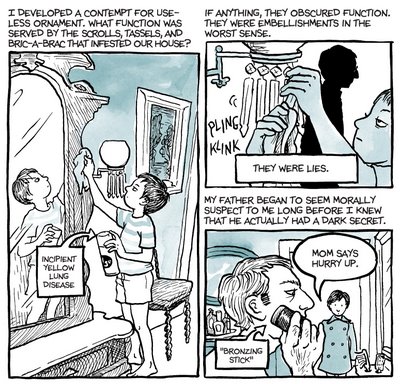



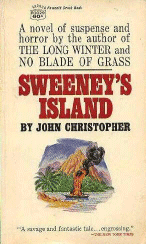 From the few biographical snippets I've read about John Christopher, he was a very prolific writer in the early part of his career. It really was a career for him and until the success of the Tripods trilogy, he had to write as much as possible. He cranked out several books a year, in several genres. He also never did any rewriting beyond the first chapter, supposedly. I don't know, his books read pretty well to me. Sweeney's Island is one of those, written in 1964. It's about a group of London bourgeois hangers-on of a very wealthy and connected guy named Sweeney. During one of his cocktail parties, Sweeney asks them to stay after where he proposes an impromptu trip on a new yacht he has just bought. He has clearly planned this very carefully, knowing that each of them either is dependent on his future generosity or is free enough to be able to just take off for a few weeks of ocean paradise.
From the few biographical snippets I've read about John Christopher, he was a very prolific writer in the early part of his career. It really was a career for him and until the success of the Tripods trilogy, he had to write as much as possible. He cranked out several books a year, in several genres. He also never did any rewriting beyond the first chapter, supposedly. I don't know, his books read pretty well to me. Sweeney's Island is one of those, written in 1964. It's about a group of London bourgeois hangers-on of a very wealthy and connected guy named Sweeney. During one of his cocktail parties, Sweeney asks them to stay after where he proposes an impromptu trip on a new yacht he has just bought. He has clearly planned this very carefully, knowing that each of them either is dependent on his future generosity or is free enough to be able to just take off for a few weeks of ocean paradise.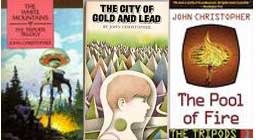
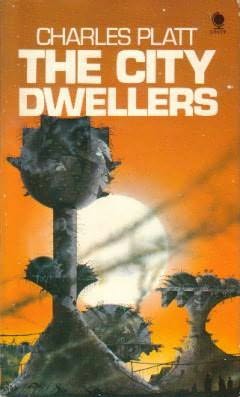 Found this one at a crazy, disheveled used bookshop way out on Mont-Royal. In the basement floor they had a few bins of english books, mostly crap from the late 80s and 90s, but I found this old british sci-fi book. It was thin and nicely yellowed, perfect for my travels to come. I didn't really know much going in, beyond that it was about characters in growing and dieing cities and it had some nice written language at the beginning.
Found this one at a crazy, disheveled used bookshop way out on Mont-Royal. In the basement floor they had a few bins of english books, mostly crap from the late 80s and 90s, but I found this old british sci-fi book. It was thin and nicely yellowed, perfect for my travels to come. I didn't really know much going in, beyond that it was about characters in growing and dieing cities and it had some nice written language at the beginning. I have toyed with Donald Hamilton in the past. It was a reading encounter with great promise that led to a real deflating letdown. He is best known for the popular Matt Helm series of manly paperbacks found in drugstore racks in the 60s and 70s. His early books were also said to be a big influence on the Parker books (written by Donald Westlake under the nom de plume Richard Stark), otherwise known as the best crime books ever. There were one or two books in particular whose titles I forget that I did read and they really did kick ass. I was so psyched because Hamilton had written so much more and they are so easy to find. I even had hope that the Matt Helm series might be competent. Unfortunately, something happened to Hamilton along the way and the other books I read by him had lost the tight, cold intelligence that had attracted Westlake. They were, instead, pandering to the audience (obvious macho tropes) and, far worse, demonstrated inefficient and emotional character behaviour. So I had to let the other Hamilton books on my on deck shelf and let go of that relationship.
I have toyed with Donald Hamilton in the past. It was a reading encounter with great promise that led to a real deflating letdown. He is best known for the popular Matt Helm series of manly paperbacks found in drugstore racks in the 60s and 70s. His early books were also said to be a big influence on the Parker books (written by Donald Westlake under the nom de plume Richard Stark), otherwise known as the best crime books ever. There were one or two books in particular whose titles I forget that I did read and they really did kick ass. I was so psyched because Hamilton had written so much more and they are so easy to find. I even had hope that the Matt Helm series might be competent. Unfortunately, something happened to Hamilton along the way and the other books I read by him had lost the tight, cold intelligence that had attracted Westlake. They were, instead, pandering to the audience (obvious macho tropes) and, far worse, demonstrated inefficient and emotional character behaviour. So I had to let the other Hamilton books on my on deck shelf and let go of that relationship.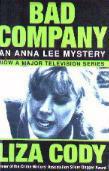 I picked this one up at the Kitsilano branch of the great Pulp Fiction bookstore in Vancouver. The British packaging caught my eye and the blurbs made it sound like it might have the right stuff. The protagonist is a female private investigator in contemporary London. Bad Company might not have been the best place to start since the heroine spends the whole time kidnapped, but it was an entertaining and well-written read nonetheless. The London underworld is richly portrayed and the lowlifes, from the stupid, inexperienced thugs who pull off the kidnapping to the serious hard and well-dressed ones who are trying to stop them as well fit well into the British empirical mold. The ending was a bit anti-climactic, but I think realistic. I'll be keeping an eye open for other Liza Cody books.
I picked this one up at the Kitsilano branch of the great Pulp Fiction bookstore in Vancouver. The British packaging caught my eye and the blurbs made it sound like it might have the right stuff. The protagonist is a female private investigator in contemporary London. Bad Company might not have been the best place to start since the heroine spends the whole time kidnapped, but it was an entertaining and well-written read nonetheless. The London underworld is richly portrayed and the lowlifes, from the stupid, inexperienced thugs who pull off the kidnapping to the serious hard and well-dressed ones who are trying to stop them as well fit well into the British empirical mold. The ending was a bit anti-climactic, but I think realistic. I'll be keeping an eye open for other Liza Cody books.

 This is a short (as many of his novels are) H.G. Wells novel that I found somewhere while traveling. It has a hilariously wrong yet accurate cover of a man and woman fighting off a dog in some ruins. It's wrong because though this scene actually happened, the picture looks like a Vallejo-esque barbaric fantasy. In the book, it is two wimpy future city-dwellers who, dissatisfied with modern life, make out for the country. At one point, they do get attacked by dogs, but the scene emphasizes how hopelessly unprepared they are for life outside of the city. I really should have scanned that cover, but I left it in the free bookshelf in the laundry room of my mom's apartment. Somebody took it so maybe it got read again, which would make it worth it.
This is a short (as many of his novels are) H.G. Wells novel that I found somewhere while traveling. It has a hilariously wrong yet accurate cover of a man and woman fighting off a dog in some ruins. It's wrong because though this scene actually happened, the picture looks like a Vallejo-esque barbaric fantasy. In the book, it is two wimpy future city-dwellers who, dissatisfied with modern life, make out for the country. At one point, they do get attacked by dogs, but the scene emphasizes how hopelessly unprepared they are for life outside of the city. I really should have scanned that cover, but I left it in the free bookshelf in the laundry room of my mom's apartment. Somebody took it so maybe it got read again, which would make it worth it.


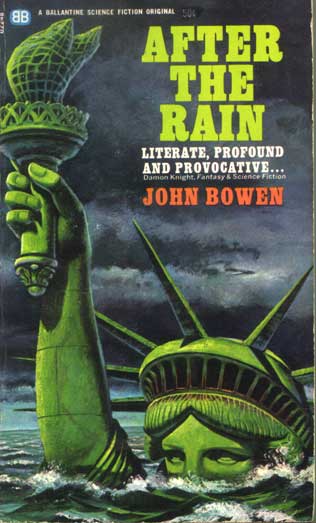
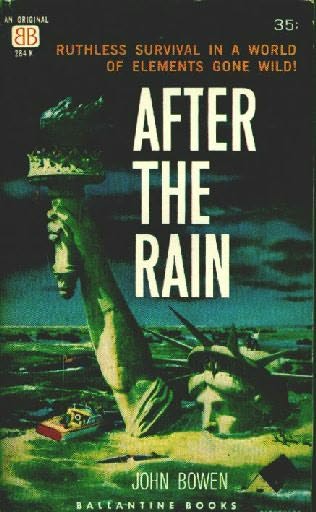
 One more classic in the PA genre, Alas, Babylon falls into the short-term category, where the novel follows the events of the cataclysm itself and the immediate aftermath. In this case, it is a very realistic Cold War nuclear exchange. In some ways, Alas, Babylon is more of a Cold War novel than a true Post-Apocalyptic novel. Though in content it is in every way an "after" novel and a really good one, I suspect that the primary goal of the writer was to address what many considered a very real possibility of the time rather than to explore an alternate future of our collapsed society.
One more classic in the PA genre, Alas, Babylon falls into the short-term category, where the novel follows the events of the cataclysm itself and the immediate aftermath. In this case, it is a very realistic Cold War nuclear exchange. In some ways, Alas, Babylon is more of a Cold War novel than a true Post-Apocalyptic novel. Though in content it is in every way an "after" novel and a really good one, I suspect that the primary goal of the writer was to address what many considered a very real possibility of the time rather than to explore an alternate future of our collapsed society.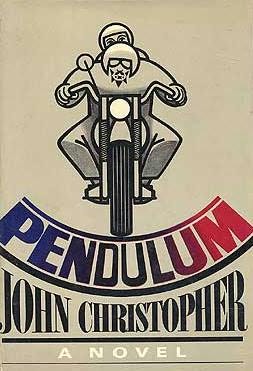

 I must enter this review by letting everyone know that the author is a friend of mine. She's closer to my sister, but we've hung out enough that my objectivity may be in question!
I must enter this review by letting everyone know that the author is a friend of mine. She's closer to my sister, but we've hung out enough that my objectivity may be in question!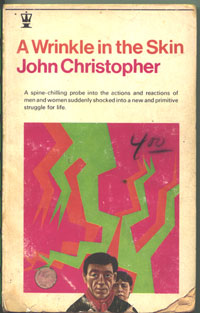 I confused John Christopher with Christopher Priest when I picked this up. No harm done since both are great writers of around the same age and touching upon very similar genres. John Christopher is best known for his children's sci-fi books, like The Tripods trilogy which we read and loved in elementary school. I see that he has a very long career as an adult sci-fi writer before that, as well as just being very prolific under a bunch of other pseudonyms as well.
I confused John Christopher with Christopher Priest when I picked this up. No harm done since both are great writers of around the same age and touching upon very similar genres. John Christopher is best known for his children's sci-fi books, like The Tripods trilogy which we read and loved in elementary school. I see that he has a very long career as an adult sci-fi writer before that, as well as just being very prolific under a bunch of other pseudonyms as well.  Donald Goines was a black author who wrote novels about black life in America in the 70s. While his books are clearly fiction, he experienced and saw most of what he wrote about. And those things are rough. I don't know how they were published at the time, but they are currently released by
Donald Goines was a black author who wrote novels about black life in America in the 70s. While his books are clearly fiction, he experienced and saw most of what he wrote about. And those things are rough. I don't know how they were published at the time, but they are currently released by 


